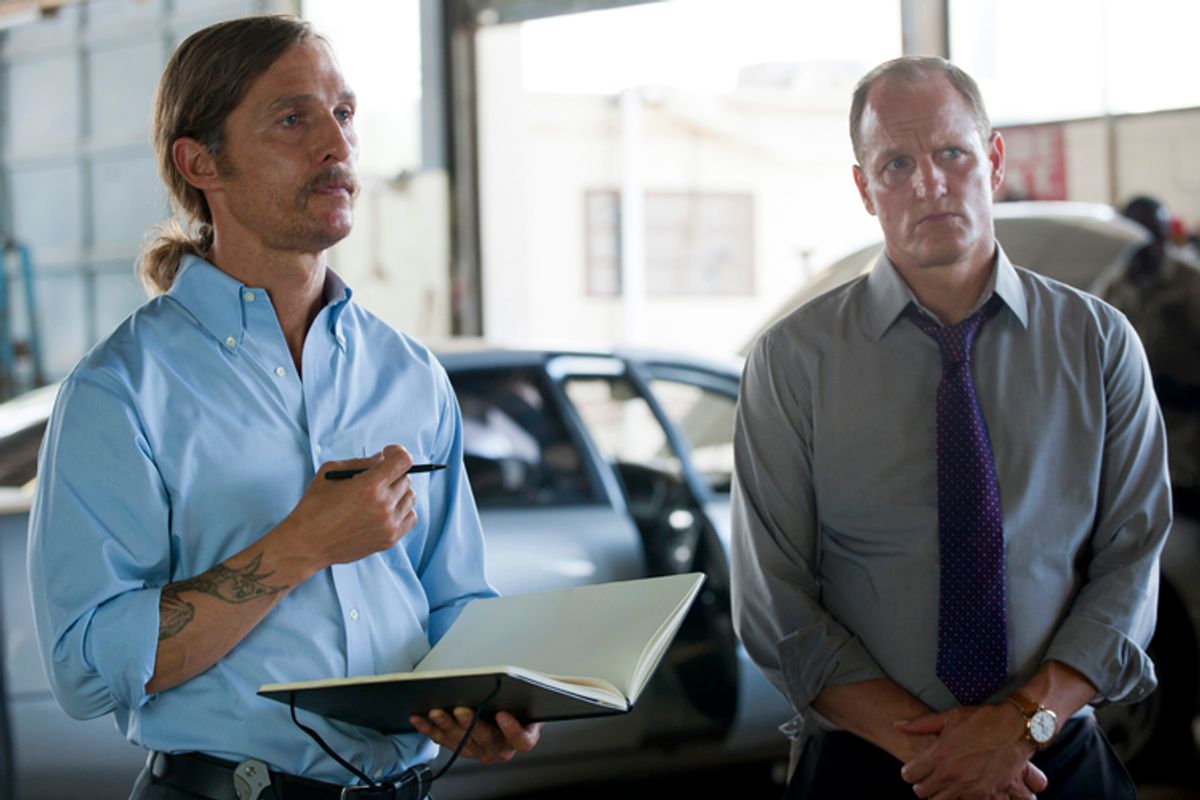Monday morning be damned. Though the water cooler bubbleth over, I will not be strong-armed into the unwinnable position of attempting to parse last night’s “True Detective” season finale in time to feed Seymour the entertainment news cycle. I am not a tween responding to a knockout video on WorldStarHiphop. Being first will not lessen the intensity of the interrobang directly following the WTF now hanging over my head like the whirling cosmos above Rust Cohle. Carcosa was a goddamned labyrinthine mind-freak, a Louisiana cave of Dagobah, and I haven’t even gotten there yet.
Let’s start with the four horrific minutes directly following the opening credits. We meet our ultimate villain – though, as it turns out, we’ve already met him, not once but twice. (I didn’t remember the first time. Did you?) The Spaghetti Man’s sanctuary is a hoarder’s paradise and a production design nightmare in the best, most literal way possible. Happy hunting to the noir-geeks still pausing their DVRs for a closer look at his rancid collection of dolls, newspapers, books and videotapes. This disfigured lawnmower man is so many serial killer types in one; you get the feeling there is lotion in baskets in every dingy nook of that house. We are, then, treated to an intimate moment between him and his mate that makes light – and whoopee – of their mutual lifetime of scars while creating a few lasting ones for us.
When, finally, we return to our heroes Cohle and Hart, they have gone so far rogue as to have absolutely no chance of building a legitimate, legally actionable case against anyone. The only resolution possible from here on out is the exposure of crimes against humanity perpetuated long ago in the hopes of conviction in the court of public outrage. And so, the bayou Batman and Robin resort to threats and blackmail and Cohle does something he seems to do only sporadically: He tells the truth. There is, indeed, a sniper in the bushes waiting to off Steve and his Maserati if he tries to turn them in or worse.
For a moment, I had trouble believing that Cohle, who seemed to have no allies left but Hart, could enlist anyone else for an enterprise so criminal. But, as is the case with much on the show, his sniper friend has been here pretty much from the beginning. He is the owner and “Norm” of the perpetually empty watering hole at which Cohle-in-the-present works. We first see him with his head down on the bar in – I’m going to say – Episode 3 and later learn that he potentially has a great stake in this investigation. Did you remember that said sniper’s child disappeared in '85? I sure didn’t. But that pretty much sums up last night’s experience for me.
I could have watched the episode again immediately after the credits rolled. But, instead, I spent the next hour going back to old episodes looking for details that I had missed or given short shrift that would help me make sense of the finale and Cohle’s rambling dissection of death and the cosmos. I stumbled upon the episode where Cohle reveals Sniper Bob’s impetus while searching for references to Cohle’s own lost child. The man’s grief was mentioned only briefly and immediately following a funny, awkward bit of acting by Woody Harrelson. I confess: I missed quite a few clues over the last eight episodes simply because I was so caught up in character as manifested by the actors’ stunning performances.
McConaughey, in particular, has been riveting and, as such, is the perfect unreliable narrator. So much of the meandering philosophy he spewed at the skeptical detectives over the course of their investigation could have been drunken bullshit, or worse, subterfuge. But Cohle rambled with such conviction that you just knew he believed every word. So, when he looks up from the overgrown aqueduct and sees the swirling universe just before death comes at him with an ax, you as the viewer must allow that, hey, all is subjective. Maybe it's an acid flashback. Or maybe for Cohle, at this moment, this is reality. This is how he confronts his life and loss, no matter how loopy it looks to us.
I think back to Cohle’s tried and true method for wringing confessions out of detainees, his insistence that all anyone needs is a narrative that makes sense to them. The right story can release anyone from guilt or regret. We’ve seen these men’s story told from different perspectives, bent and twisted toward their different ideals. They have lied, omitted, conspired and presented their case as true to their own faiths as possible. But seeing as how no one actually goes to jail, whether or not you believe justice was served appropriately depends on how you square Cohle and Hart’s rationale with your own. For me, at least, that means going back, looking past their relative Southern charms and flaws and seeing how the evidence stacks up. That’s going to take some repeated viewing. Luckily, time is a flat circle.

Shares